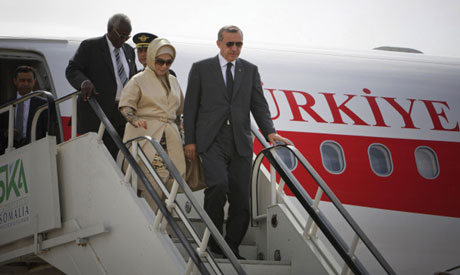 by Abdirahman Aynte
by Abdirahman Aynte
Sunday, August 21, 2011
DOHA, QATAR--- For 20 years, the Somali people felt globally ignored—and even cursed to statelessness, merciless warlords, savage terrorist groups and rapacious foreign actors.
 Turkish PM Recep Tayyip Erdogan and his wife Emine Erdogan disembark from their plane at Aden Abdulle International Airport on their first official visit to Somalia (AP photo) |
This historic Friday was when Recep Tayyip Erdogan, the charismatic leader of Turkey made a landmark visit to Mogadishu, Somalia’s decapitated capital as the country copes with a calamitous famine.
With five cabinet ministers, his wife and children in tow, Erdogan braved to venture into the world’s most violent city with a simple but a powerful message: that starving to death due to famine in the 21st century was an international disgrace.
Erdogan’s trip was categorically different. Whereas leaders of neighboring nations are universally seen as part of the problem, Erdogan is widely viewed as the one leader who could “save Somalia,” as the Somali cacophony went since his visit. The reason is simple: in addition to projecting an avuncular aura with his demonstrably compassionate visit to destitute famine victims, he is rightfully seen as not having a vested interest in the intricate affairs of Somalia.
Still, even if Erdogan chooses to limit his foray into Somalia on humanitarian issues, he has done remarkable things for Somalis. No foreign leader has ever galvanized the population as he did. The pictures of him and his wife holding bony children and hugging horrified mothers whose children starved to death—even as Somali leaders appeared aloof and indifferent--- will never be erased from the memory of the Somali people.
Global appreciation
The Somali people can never exact the gratitude by Erdogan and the Turkish people. But many have done the best they could to appreciate. The Facebook page set-up to thank Erdogan attracted thousands of fans just in two days. Many are also sending letters to his office in Ankara. Diaspora Somalis, whose active role in alleviating the suffering can’t be underestimated, are flocking to Turkish embassies in London, Ottawa, Kuwait, Washington and Nairobi, just to name a few.
Others are electing to memorialize Turkey permanently. Birth records across Somalia show that “Istanbul” is now the most popular name for newly born girls. Many have also vowed to buy Turkish products.
While the people of Somalia have attempted to reciprocate the gratitude, their government is disappointingly slow. For nearly a year, the Somali embassy in Turkey had no permanent diplomats. A lone charge d’affaires had been doing the minimum. Somalia’s leaders, unbeknown for pro-activity in the first place and notorious for indecisiveness, have failed to seize this opportunity and appoint an impromptu ambassador. This, even as Erdogan brought his newly minted ambassador to Mogadishu, and asked him to remain in the capital to oversee the relief efforts.
Contextualizing the visit
A Turkish professor who’s a friend of mine and a keen observer of his country’s affairs, contends that Erdogan’s visit to Somalia was, by far, his most important trip overseas. That’s because, he says, the Turkish foreign policy is anchored “on moral authority, not military and economic clout.”
Lending a helping hand and spearheading the global relief effort to help famine victims perfectly folds into that dictum. Moreover, the professor argues that Erdogan’s response—or lack thereof—to the “Arab Spring” was seen at home as inconsistent and erratic. Therefore, the prime minister wanted an inherently non-controversial global issue to reclaim his international stature and put his rivals on notice.
Which, he aptly did. The leader of Turkey’s opposition is also going to Somalia in the coming weeks. Mogadishu is now the Mecca for Turkish politicians.
Regardless of how Erdogan’s Somalia visit plays into Turkish domestic politics, however, the man has also embarrassed Somalia’s erstwhile “brothers”—the largely indifferent Arab world. With the exception of Kuwait, Qatar and UAE, who all sent food supplies, the rest are either grappling with internal dissent or simply don’t think of Somalis as “brothers.”
Which brings me to my last point: Erdogan’s visit has also helped many Somalis redefine their sense of belonging. Most Somalis prefer to trace their roots to the Arabs, and to a lesser extent, to the Africans. The straddle between the two has left no room for distant “Muslim Brothers.” Since Erdogan’s visit, Turkey, in a stunning reversal of fortunes, has become the “brother” par excellence.
Somalia desperately wanted a big brother. Now, the expectations are immeasurably high for Turkey.
Abdirahman Aynte is a journalist and an author. He welcomes feedback at: [email protected]